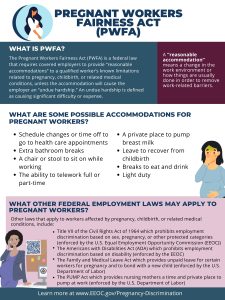WASHINGTON (OSV News) – Final regulations for the Pregnant Workers Fairness Act will grant workers protections for time off and other job accommodations for pregnancy-related medical conditions like miscarriage, stillbirth and lactation – but also for abortion, which was opposed by many of the bill’s supporters.
The regulations govern the implementation of the bipartisan legislation passed by Congress and signed into law by President Joe Biden in December 2022, and went into effect the following June. The law prohibits employment practices that discriminate against making reasonable accommodations for qualified employees due to their pregnancy, childbirth or related medical conditions.
But a rule proposed by the Equal Employment Opportunity Commission in August 2023 governing the implementation of that law contained broad language including abortion among “related medical conditions,” and the potential circumstances for which employers may have to grant workplace accommodations, such as time off for medical appointments or additional rest breaks.
The EEOC issued a notice on April 15 that the final rule will be published in the Federal Register on Apr. 19.

The EEOC noted in its final rule that it had received 54,000 comments against, and 40,000 comments for, the inclusion of abortion in the regulations. Regarding abortion’s ultimate inclusion in the regulations governing the workplace anti-discrimination law, it stated “the type of accommodation that most likely will be sought under the PWFA regarding an abortion is time off to attend a medical appointment or for recovery.”
In an April 15 statement, EEOC Chair Charlotte A. Burrows said, “The Pregnant Workers Fairness Act is a win for workers, families, and our economy.”
“It gives pregnant workers clear access to reasonable accommodations that will allow them to keep doing their jobs safely and effectively, free from discrimination and retaliation,” Burrows said.
Burrows said the EEOC has assisted women who have “experienced serious health risks and unimaginable loss” for the simple reason that they could not access reasonable accommodations.
“This final rule provides important information and guidance to help employers meet their responsibilities, and to jobseekers and employees about their rights,” she said. “It encourages employers and employees to communicate early and often, allowing them to identify and resolve issues in a timely manner.”
Dr. Verda J. Hicks, president of the American College of Obstetricians and Gynecologists, said in a statement that the legislation “plays a critical role in protecting the health and improving the lives and well-being of people during and after pregnancy and in ensuring that people are able to continue working without jeopardizing their health.”
Hicks said the “broad, compassionate application of the Pregnant Workers Fairness Act will ensure that fewer workers are subject to unfair treatment, recrimination, or retaliation as a result of or after a pregnancy.”
But in a statement, Rep. Virginia Foxx, R-N.C., chairwoman of the House Education and the Workforce Committee, said the rule “goes well beyond EEOC’s authority.”
“The PWFA was intended to ensure employers provide reasonable accommodations to pregnant employees,” Foxx said. “The PWFA does not apply to abortions. The term ‘abortion’ is not once mentioned in the law. Instead of following congressional intent, the Biden administration is using the regulatory process to advance radical policy goals.”
Many pro-life organizations, as well as the U.S. Conference of Catholic Bishops, backed the passage of the Pregnant Workers Fairness Act, but have criticized the Biden administration’s inclusion of abortion in regulations implementing the law.
Bishop Michael F. Burbidge of Arlington, Virginia, chair of the USCCB Committee on Pro-Life Activities, said in August 2023 the bishops supported the bipartisan Pregnant Workers Fairness Act because it was “pro-worker, pro-family, and pro-life.” He called it “a total distortion to use this law as a means for advancing abortion, and the complete opposite of needed assistance for pregnant mothers.”
